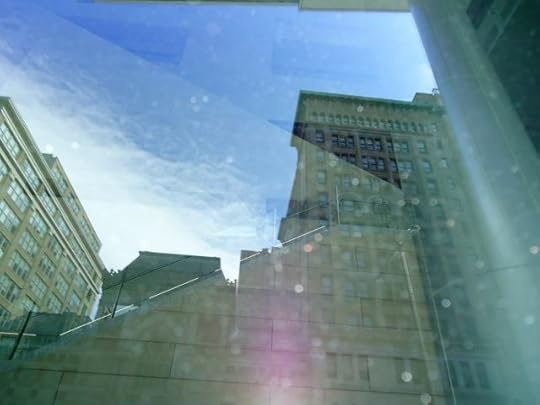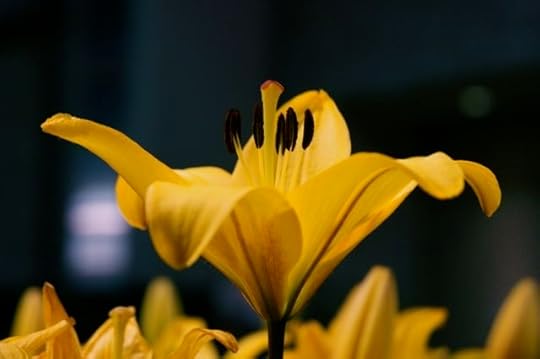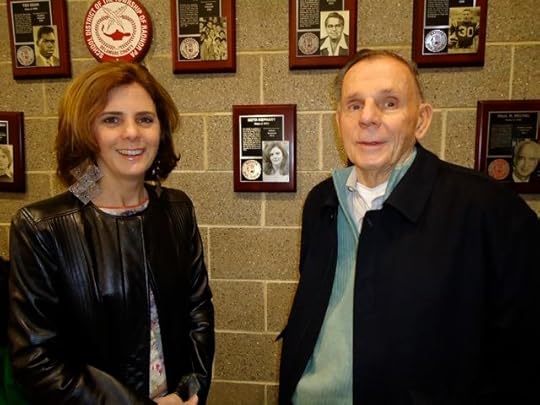Beth Kephart's Blog, page 254
March 11, 2011
Living my luck
 This week my students are writing to me from all around the world—from Warsaw, Poland, from Jeju Island, from Mexico. (They are in China, too, and on the high seas dancing; they are in the Philippines and doing an in-service project in Florida.) It's their spring break, and I am awed by the places they go, the things they see, the way their lives unfold. I am grateful for their goodness, for their presence in my life.
This week my students are writing to me from all around the world—from Warsaw, Poland, from Jeju Island, from Mexico. (They are in China, too, and on the high seas dancing; they are in the Philippines and doing an in-service project in Florida.) It's their spring break, and I am awed by the places they go, the things they see, the way their lives unfold. I am grateful for their goodness, for their presence in my life.This evening, my own son takes the long bus ride home; we will have him near for ten days. I try to clear my desk of the work that is here (even as more floats in). I plan for his nearness, his stories, his laugh. Never enough time—never. But this time, at least.
And this is luck, I think—my son, these kids, this life. And this is me living my luck best as I can.




Published on March 11, 2011 04:54
March 10, 2011
Townie/Andre Dubus III: First Reflections
 Years ago, after I finished writing my third book, Still Love in Strange Places, Andre Dubus III wrote words for that jacket that still stun me. Quiet and elegant words, beautifully crafted, followed by a note of equal elegance. You don't forget people (perfect strangers) who do those things for you. You tuck them into a special place on your shelf of fortunes.
Years ago, after I finished writing my third book, Still Love in Strange Places, Andre Dubus III wrote words for that jacket that still stun me. Quiet and elegant words, beautifully crafted, followed by a note of equal elegance. You don't forget people (perfect strangers) who do those things for you. You tuck them into a special place on your shelf of fortunes.I have read all Dubus books since, watched his House of Sand and Fog on the big screen, wondered where his craft came from (though of course there were the genes, the blood legacy of his namesake author father), and while I knew the bare outlines of Dubus's personal story, I never guessed at what he reveals in his new memoir, Townie. Dubus was one of four kids left to hardscrabble living after the separation of the mother and dad. Having left the family to pursue a life as a published, teaching author, Dubus the elder appeared once or twice a week for years—took the kids to dinner, interceded on behalf of bullies, taught his teenager son to toss a ball, but stayed, otherwise, where he was, in his zone of writing and teaching and young and hip friends and outside the circle of his family. It was Dubus's mom who was left to the overwhelm of single parenthood, and it did, Dubus's reveals, overwhelm her. Boyfriends came and went, houses were abandoned, much was filth and poverty, alcohol and drugs, and nearly everything was violence.
I'm going to write more about this book in a few days to come. But just now I want to share this passage, early in the book—a passage that is, I think, a high example of classic, gorgeous writing. There's the hard truth here, in other words. There is also tenderness. Story and situation, I tell my students (using Gornick's terms). Here are both, the perfect web.
The house was almost always dirty. Whatever chores Mom would give us, we just did not do. But some days, cooped up in that small hot house, one or two of us would finally leave the TV, grab the broom, and start sweeping the floorboards, the narrow wooden stairs and hallway. We might wash the backed-up dishes in the kitchen, find the mop and scrub the floor. We'd go up to our rooms and make our beds, pick dirty clothes out of the corners, and stuff them into a garbage bag for when we went to the laundromat. Sometimes I'd go out to our tiny enclosed yard and sweep the concrete stoop. In the corner of the fence was a rusty rake and I'd use it on our dirt yard. I made straight even lines parallel to the fence. It was still a dirt yard, but standing on the concrete stoop after, looking down at it, our home seemed somehow more orderly, our lives within it more comprehensible.




Published on March 10, 2011 05:00
March 9, 2011
Unconscious thought (for the writers among us)
 While waiting for the dentist, a different issue of Newsweek on my lap, I encounter something that I have long known to be true for me (but hey, I just thought I was weird). I walk away from the computer to dream or write. I check no emails, don't carry my phone. I seek, and nurture, a deliberate fogginess, retreating to a far somewhere before I allow myself to think about the story or sentence at hand. Some people think I am sleeping. I understand that I'm not. I can't write unless I enter this fog state first. It's the most peaceful—and productive—place that I go.
While waiting for the dentist, a different issue of Newsweek on my lap, I encounter something that I have long known to be true for me (but hey, I just thought I was weird). I walk away from the computer to dream or write. I check no emails, don't carry my phone. I seek, and nurture, a deliberate fogginess, retreating to a far somewhere before I allow myself to think about the story or sentence at hand. Some people think I am sleeping. I understand that I'm not. I can't write unless I enter this fog state first. It's the most peaceful—and productive—place that I go.But don't take it from me. This from a Sharon Begley story titled "I Can't Think," in the March 7 issue of Newsweek:
Creative decisions are more likely to bubble up from a brain that applies unconscious thought to a problem, rather than going at it in a full-frontal analytical assault. So while we're likely to think creative thoughts in the shower, it's much harder if we're under a virtual deluge of data. "If you let things come at you all the time, you can't use additional information to make a creative leap or a wise judgment," says [Joanne] Cantor (author of Conquer Cyber Overload). "You need to pull back from the constant influx and take a break." That allows the brain to subconsciously integrate new information with existing knowledge and thereby make novel connections and see hidden patterns....




Published on March 09, 2011 08:32
Robert Pattinson on Fame and Higher Fortunes
 I read the Robert Pattinson profile in Vanity Fair. I take note: Of the prison that is fame. Of the insecurity of the artistically ambitious. Of the predicament of a nearly 25-year-old actor who has been engulfed by the Twilight surge and wants, more than anything, to know who he is and what he is actually made of.
I read the Robert Pattinson profile in Vanity Fair. I take note: Of the prison that is fame. Of the insecurity of the artistically ambitious. Of the predicament of a nearly 25-year-old actor who has been engulfed by the Twilight surge and wants, more than anything, to know who he is and what he is actually made of. I decide that what I love most is RPlatz's restless quest for knowledge—reading, they say, some 20 books during the filming of Water for Elephants, none of those books, from what I can tell, easy: Eat the Rich, Money, the Keith Richards autobiography, a book of David Foster Wallace essays. To not be able to walk a street, sit at a bar, or relax behind a curtain without the accompanying throng of fans (even if, in his case, they most unilaterally love him)—that sounds like hell to me. To escape inside a book or 20—he's no dummy, that RPlatz.




Published on March 09, 2011 05:37
March 8, 2011
What makes a woman brave? How does a woman shake the world?
 Between meetings, I sat at a client's office with the March 14 issue of Newsweek on my lap, studying its remarkable center spread: "150 Women Who Shake the World." "They are heads of state and heads of household," the story begins. "Angry protesters in the city square and sly iconoclasts in remote villages. With a fiery new energy, women are building schools. Starting businesses. Fighting corruption...."
Between meetings, I sat at a client's office with the March 14 issue of Newsweek on my lap, studying its remarkable center spread: "150 Women Who Shake the World." "They are heads of state and heads of household," the story begins. "Angry protesters in the city square and sly iconoclasts in remote villages. With a fiery new energy, women are building schools. Starting businesses. Fighting corruption...."The pages that follow tell stories—feature heroines—we women can be proud of. Chouchou Namegabe is here, honored for her radio documentation of an epidemic of rapes in Congo. Sharon Cooper, for her studies of the brain development of trafficked girls. Ellen Johnson Sirleaf, as Africa's first female head of state. Salma Hayek, for her worldwide travels on behalf of maternal health. Valerie Boyer, for her fight against eating disorders. Amy Gutmann, from my own University of Pennsylvania. Shakira for her Barefoot Foundation, started when she was just 18 (it says here) to open schools in Colombia, Haiti, and South Africa. Mia Farrow for not letting us forget Darfur. Elizabeth Smart, the kidnapping survivor who has become an advocate for victims. Rebecca Lolosoli of Kenya, who "persuaded women in her village to start a business selling their intricate traditional beadwork to tourists. Then she encouraged them to form a separate village as both a tourist attraction and a refuge for victims of domestic violence and girls fleeing female genital mutilation or forced marriage."
Get this issue, if you can. Look at what women can do—at what happens when they stand up on behalf of others and seek a greater, calming good. And then, if you have a moment, check out page 79. That's where my friend Caroline Leavitt's book, Pictures of You, is featured as a Jodi Picoult Pick.




Published on March 08, 2011 13:09
Reporting back from an evening out
 When you spend an evening with Jan Suzanne (and the equally fun-fascinating Maureen) you throw all caution to the wind. You stroll, for example, through the Philadelphia Flower Show and—squinting, dreaming—you watch confetti rise above the heads of apparent anemones.
When you spend an evening with Jan Suzanne (and the equally fun-fascinating Maureen) you throw all caution to the wind. You stroll, for example, through the Philadelphia Flower Show and—squinting, dreaming—you watch confetti rise above the heads of apparent anemones. Later you head to the extra super delicious Amis on Waverly Street, sit at the chef's table, and let Maureen (a star herself on the Philadelphia restaurant scene) select the evening's array of tapas. Let's just say they served up a little eggplant, winter squash lasagna, quail, and octopus magic.
Later you head to the extra super delicious Amis on Waverly Street, sit at the chef's table, and let Maureen (a star herself on the Philadelphia restaurant scene) select the evening's array of tapas. Let's just say they served up a little eggplant, winter squash lasagna, quail, and octopus magic.



Published on March 08, 2011 02:30
March 7, 2011
Dangerous Neighbors: The Library Media Connection Review
 I had just boarded the train for the Philadelphia Flower Show when Greg Ferguson of Egmont USA sent along word of a most gracious Library Media Connection Review of Dangerous Neighbors. Humbled, I share it with you:
I had just boarded the train for the Philadelphia Flower Show when Greg Ferguson of Egmont USA sent along word of a most gracious Library Media Connection Review of Dangerous Neighbors. Humbled, I share it with you:This historical fiction takes place during the 1876 Philadelphia World's Fair. Anna's accidental demise leaves her twin sister Katherine recalling the time they spent together and how they have recently grown apart. Katherine decides that she just join her sister in death and plans to jump off an exhibition building at the World's Fair. But as she prepares herself, her sister's lover finds her, desperate to share something with her. Katherine won't listen and escapes before he can share his news. She vows to carry out her thwarted suicide plan another day. However, Katherine is forever changed by the events that are set in motion by her choices. While the story is compelling enough for readers who enjoy historical fiction, this books' excellence lies in the subtle descriptions nestled in Kephart's writing. It is a book beautifully done, the complex human emotions of heartbreak and hope exquisitely intertwined.




Published on March 07, 2011 18:47
Remain Vulnerable
 I'll stop work mid-afternoon today, hop a train, and head to the Philadelphia Flower Show (but before the Flower Show, Tweed, says my friend Jan Suzanne, after the Show, tapas—that's my Jan Suzanne). I'm charging both cameras. I'm surveying my comfortable shoes. And I'm recalling this quote from Forrest Gander, which I shared with you once, years ago:
I'll stop work mid-afternoon today, hop a train, and head to the Philadelphia Flower Show (but before the Flower Show, Tweed, says my friend Jan Suzanne, after the Show, tapas—that's my Jan Suzanne). I'm charging both cameras. I'm surveying my comfortable shoes. And I'm recalling this quote from Forrest Gander, which I shared with you once, years ago:@font-face {
font-family: "Cambria";
}p.MsoNormal, li.MsoNormal, div.MsoNormal { margin: 0in 0in 0.0001pt; font-size: 12pt; font-family: "Times New Roman"; }div.Section1 { page: Section1; }
"Maybe the best we can do is leave ourselves unprotected.... To approach each other and the world with as much vulnerability as we can possibly sustain."I have opened myself to the possibility of amazement. I will return with images for you.




Published on March 07, 2011 06:21
March 6, 2011
The start of something new
 Today, very quietly, very on my own, I wrote the first five pages of this book I've been dreaming of, then outlined nine chapters in. It's memoiristic nonfiction, and so an outline was in order. It's nice to work words during a rainstorm.
Today, very quietly, very on my own, I wrote the first five pages of this book I've been dreaming of, then outlined nine chapters in. It's memoiristic nonfiction, and so an outline was in order. It's nice to work words during a rainstorm.



Published on March 06, 2011 15:20
A Quick Moment at the Radnor High Hall of Fame Wall
 Yesterday, prior to "Seussical," my father and I spent this moment along the Radnor High Hall of Fame wall. I don't think I'll ever win an honor that could mean as much as this one still means to me, and it was fun to share it with my dad. (Thank you, Libby, for snapping the photo.)
Yesterday, prior to "Seussical," my father and I spent this moment along the Radnor High Hall of Fame wall. I don't think I'll ever win an honor that could mean as much as this one still means to me, and it was fun to share it with my dad. (Thank you, Libby, for snapping the photo.)



Published on March 06, 2011 03:27



